Knowledge will forever govern
ignorance, and a people who mean to be their own governors,
must arm themselves with the power knowledge gives. A popular
government without popular
information or the means of acquiring it, is but a prologue to a farce
or a tragedy or perhaps both.
-- James
Madison
Parallel Report to the Human Rights Committee
on the occasion of the consideration of the
Sixth Periodic Report of Germany
during the Committee’s 106 th Session
submitted by:
Walter Keim, participant of the Baltic
Sea NGO Forum
Torshaugv. 2 C
N-7020 Trondheim, 16th June 2011 [updated 14. September 2012]
 auf Deutsch:
http://wkeim.bplaced.net/files/if-dimr-pbt.htm
auf Deutsch:
http://wkeim.bplaced.net/files/if-dimr-pbt.htm
Human Rights Institute
(Deutsches Institut für Menschenrechte)
Zimmerstr. 26/27
D-10969 Berlin |
Committee of Human Rights (Ausschuss für Menschenrechte und
humanitäre Hilfe)
Federal Parliament Bundestag
Platz der Republik 1
D-11011 Berlin
|
Copy: Transparency, Greenpeace, Deutsche Gesellschaft für
Informationsfreiheit, Humanistische Union, netzwerk recherche, Mehr
Demokratie
[Nobody answered, therefore this letter was sent directly to the Human
Rights Committee]
106
session: Access to Information
is missing in the 6. state report of Germany according to Article
40 of the Civil Covenant CCPR
Contents:
- Access to public documents is a human right according to Article 19
CCPR
- 5 states in Germany violate the human right of access to public
documents found for 5.9 billion i. e. 84 % of the worlds population
- The rank of CCPR as a law is de
facto not respected
- Recommendations:
- Germany has to adopt access to informations (ATI) laws in all 16
federal states and improve federal ATI law to meet international
standards
- Withdraw reservation on Article 19 of CCPR
- The rank of CCPR in German law must be respected and should be
improved.
- The recommendations of the Human Rights Commissioner
of the Council of Europe, e. g. educate administration and judges in
international law i. e. CCPR should be done.
- Judges should not be hired, promoted and supervised
by the executive power i. e. Resolution
1685
(2009) and Recommendation
No.
R
(94)12 of the Council of Europe should be followed.
- CCPR, International Covenant on Economic, Social and Cultural
Rights and the European Convention of Human Rights should be
included in the Internet collection of the "laws of Germany" (www.Gesetze-im-Internet.de
and http://bundesrecht.juris.de).
- The German Institute of Human Rights should monitor human rights in
Germany.
- Defamation should be decriminalized.
I refer to the 6. report according to Article 40 of the International
Covenant on Civil and Political Rights, reporting to the Human Rights
Committee (CCPR) dated 31. March 2010 (1).
The EU Fundamental Rights Agencysuggested to
contact the Council of Europe (2),
answering a complaint on lack of Freedom of information in Germany (3).
The GRECO (Group of States against corruption) did not observe that access
to informations laws are missing in 5 states in Germany (N).
1. Access to public documents is a human right according to Article 19
CCPR
Freedom of Information (including access to public documents) is part of Article 19 the International Covenant on Civil
and Political Rights (ICCPR), which Germany has
signed.
The UN Special Rapporteur on the promotion and protection
of the right to freedom of opinion and expression reported e. g. in E/CN.4/1998/40,
28 January 1998, E/CN.4/2000/63,
18 January 2000 and A/HRC/14/23,
20 April 2010 that access to public documents is a human right.
UN,
OSCE and AOS Special Mandates for Protecting Freedom of Expression confirmed in Joint Declaration of 6. December 2004, that access to information is a human right: (4):
"The right to access information held by public authorities is a
fundamental human right which should be given effect at the national
level through comprehensive legislation (for example Freedom of
Information Acts) based on the principle
of maximum disclosure, establishing a presumption that all
information is accessible subject only to a narrow system of
exceptions."
The "General Comment No. 34 on Article 19 of the ICCPR" confirms
this (5):
"18. Article 19,
paragraph 2 embraces a general right of access to information held by
public bodies. Such information includes all records held by a public
body, regardless of the form in which the information is stored, its
source and the date of production."
"19.(...) States parties should also enact the necessary procedures,
whereby one may gain access to information, such as by means of freedom
of information legislation."
Germany tried to remove the human right of access to public documents and
other human rights (13)
from the Draft
General
Comment No. 34 on Article 19 ICCPR (see page 17 reference
14). Decriminalization of defamation and abolition of prison sentences
(Article 49) is objected. Access to public documents is not considered a
fundamental right according to the German Basic Law. The ICCPR has only the
rank of a law. Therefore it is suggested to remove access to public
documents from the ICCPR.
2. Five states (Länder) violate the human right of access to public
documents
I have informed the states Hesse, Lower
Saxony, Saxony,
Bavaria
and Baden-Württemberg
several times about the human right access to public documents. However
these states continue to violate this human right and access laws are not
given (6).
The NGO "Bündnis für Informationsfreiheit in Bayern" has collected many
examples of denial of access (10).
Reference
7 gives additional examples of denial of access to public documents.
The UN Convention against Corruption of 14. December 2005 has been
ratified by 158 states. However Germany
could not ratify because bribery of members of parliament is not a
criminal act. This law would have to be given by parliamentarians
itself.
[The Group of
States against Corruption
(GRECO) of the Council of Europe saw
deficiencies combatting corruption in Germany and made 2009
suggestions on transparency of financing of parties (K).
The federal parliament Bundestag refused 2011 (see "Ausschussdrucksache
17(4)283 des Innenausschusses") to comment these suggestions with the
majority of the governing coalition parties of CDU/CSU and FDP (M)]
[More than 115 states with 5.9
billion i. e. 84 % of the world population adopted either FOI laws
or constitutional provisions (I).
Citizens in 5 states in Germany with half of the population lack this
human right.]
3. The rank of the ICCPR is not respected in praxis
Paragraph 118 of the State report reads: "CCPR is part of German justice
system as federal law. Therefore it is binding for federal states." But this
is not respected by German administration and courts.
Therefore German courts may decide against human rights if there is a
conflict, e. g. the highest Court in the German land Rhineland-Palatinate
LG Mainz (1 QS 25/98) stated that the court can not give access
to documents (as the European Convention of Human Rights would demand),
because it is the parliament, which would have to give this right. This
court expresses here that they are not allowed to do what human rights would
say.
Internet pages "laws in Internet" (www.Gesetze-im-Internet.de
and http://bundesrecht.juris.de)
do not contain the CCPR. Therefore I have 28.
April 2007 suggested to add it together with other human rights
covenant. The answer 14. July 2007 says
that the capacity was not big enough. It is difficult to believe this
as reason.
Court cases Walter Keim ./. Germany VG
2 A 85.04 and VG
2 A 55.07 show that the Administrative Court of Berlin
(Verwaltungsgericht Berlin), and the Higher Administrative Court
(Oberwaltungsgericht) and later the Constitutional Court (Verfassungsgericht)
in cases 1 BvR 1981/05, 1
BvR 2565/05 and 1
BvR 238/09 that the human rights character of access to public
documents of the CCPR is ignored (7).
Many applications referring to the CCPR are denied without even discussion.
This proves that the rank of CCPR being a law is ignored (7).
The ICCPR human right access to public documents is rejected by the German
government, because it is considered no fundamental right of the German
Basic law (constitution) (13).
The reservation on Article 19 CCPR restricts foreigners rights in Germany.
[The federal law of Freedom of Information has too many exceptions and
violates international principle of maximum disclosure. Comparison with
laws from 111 other countries places Germany
on 105th rank, i. e. 5.9 billion people have better access laws(J).]
4. Recommendations
The Report of the Human Rights Commissioner of the Council of
Europe 2006 suggests to educate administration and judges in human
rights e. g. CCPR (8). Unfortunately both the federal and local parliaments refused
to consider this proposition (9).
Judges at administrative courts are hired, promoted and supervised by
the executive power and are not independent according to Article 14
CCPR (11).
In approx. 50 States access to public documents is found in the
constitution. Approx. 90 states have adopted
access to information laws. In Europe basically Belarus and 5 German
states are missing. After India in 2005, China in 2008, Russia in 2010 and
Brazil soon (BRIC countries) adopt laws on access to information only some
countries in Africa and the Middle East are missing.
Germany's report should have been given 1.
April.2009. The report was registered 18. April 2011 at UN.
In many states – e. g. for the European Convention of Human Rights -
international conventions have a higher rank compared to laws e. g.
Austria, Switzerland and Norway (12).
The Human Rights Commissioner of the Council of Europe suggested to give
the German Human Rights Institute the task to monitor human rights in
Germany (F).
Recommendations summarized:
- Germany has to adopt access to informations (ATI) laws in all 16
federal states and improve federal ATI law to meet international
standards
- Withdraw reservation on Article 19 of CCPR
- The rank of CCPR in German law must be respected and should be
improved.
- The recommendations of the Human Rights Commissioner
of the Council of Europe, e. g. educate administration and judges in
international law i. e. CCPR should be done.
- Judges should not be hired, promoted and supervised
by the executive power i. e. Resolution
1685
(2009) and Recommendation
No.
R
(94)12 of the Council of Europe should be followed.
- CCPR, International Covenant on Economic, Social and Cultural
Rights and the European Convention of Human Rights should be
included in the Internet collection of the "laws of Germany" (www.Gesetze-im-Internet.de
and http://bundesrecht.juris.de).
- The German Institute of Human Rights should monitor human rights in
Germany.
- Defamation should be decriminalized.
Yours sincerely,
Walter Keim
Copy: Human
Right
Commissioner of the CoE, Fundamental
Rights
Agency, Ausschuss
für Menschenrechte und Humanitäre Hilfe, Dr. Valentin AICHELE, Legal
adviser, German Institute for Human Rights, OSCE,
Mr. Frank La Rue, UN
Special Rapporteur
References:
- Consideration of reports submitted by States parties
under article 40 of the Covenant CCPR: http://www.ccprcentre.org/doc/HRC/Germany/CCPR_C_DEU_6_en.doc
- 26.03.2007: German Human Rights Institute is
responsible for human rights in Germany: http://wkeim.bplaced.net/files/eu-hra-070329.pdf
- 01.03.2006: Access to Information and other Violations
of Human Rights in Germany : http://wkeim.bplaced.net/files/eu-hra-complaint.htm
- 2004 International Mechanisms for Promoting Freedom of
Expression: JOINT DECLARATION http://merlin.obs.coe.int/iris/2005/2/article1
- General
Comment
No. 34 on article 19 by the Human Rights Committee: http://www2.ohchr.org/english/bodies/hrc/comments.htm
- 5 federal states (lander) ignore the human right
of access to public documents: http://wkeim.bplaced.net/files/ifg-5-laender-en.htm
- Administration and jurisprudence about freedom of
information: http://wkeim.bplaced.net/files/ifg-material.htm
- Petition realisation of the suggestions of the Human
Right Commissioner of the CoE: http://wkeim.bplaced.net/petition_gg.htm
- Rejection of the suggestions of the Human Right Commissioner of the
CoE by parliament Bundestag and 8 länderparliaments: http://wkeim.bplaced.net/coe_resultat.htm#antworten
- Bündnis für Informationsfreiheit in Bayern: (In)transparenz in Bayern:
http://www.informationsfreiheit.org/3964.html
- Separation of powers in Europe: http://wkeim.bplaced.net/files/separation_of_powers.htm
- Geiger, Grundgesetz und Völkerrecht, 5. Auflage, S. 160; Schweisfurth,
Völkerrecht, S. 202; Nowak, CCPR-Commentary, Second editition, Art. 2,
Rn. 55
- 11. February 2011:
Germany asked to remove the human right of access to public documents
and other human rights: http://wkeim.bplaced.net/files/German_comments_on_Draft_General_Comment_No.34.pdf
- HUMAN RIGHTS COMMITTEE. DISCUSSIONS ON
DRAFT GENERAL COMMENT NO. 34- MEETING NOTES (18 MARCH – 24 MARCH
2011): http://freedominfo.org/documents/HRCnotesMarch2011.pdf
- X. Baltic Sea NGO Forum, Final
Statement, WS III: Human rights: http://www.bsngoforum.org/files/Final_statement.pdf
- We urge the CBSS to create an Ombudsman for Human Rights.
- In each country of the Baltic Sea Region, there shall be installed
independent national Human Rights Institutes according to the Paris
principles.
- The workshop recommends that the Baltic Sea NGO Network oversee the
implementation of the Universal Periodic Review (UPR) process in each
country of all the CBSS member states.
- X. Baltic Sea NGO Forum: The
role of international lawmakers and their respective influence on
national legislation on access to information: http://wkeim.bplaced.net/files/ATI-BSNF.htm
Internet publications:
- Telepolis (15.04.2002): Informationsfreiheit
ist
ein UN Menschenrecht:
http://www.heise.de/tp/deutsch/special/frei/12314/1.html
- Telepolis (08.06.2002): Bananenrepublik Deutschland: http://www.heise.de/tp/deutsch/special/frei/12689/1.html
- Telepolis (03.05.2002): Was kann der einzelne Bürger bewirken?
Interview mit Walter Keim: http://www.heise.de/tp/r4/artikel/12/12456/1.html
- Tagesspiegel (l 8.12.2006): Europäischer
Menschenrechtshof:
Präsident ermahnt Deutschland.
- Tabellarische Übersichten: Menschenrecht
Informationszugangsfreiheit im Bundesgesetzblatt (BGBl.): http://wkeim.bplaced.net/IFG.htm#Europarat
- REPORT BY THE COMMISSIONER FOR HUMAN RIGHTS MR THOMAS
HAMMARBERG ON HIS VISIT TO GERMANY:
http://wkeim.bplaced.net/files/Bericht-des-Menschenrechtskommissars.html: Strengthen
the
mandate of the German Institute for Human Rights with regard to
structural and factual monitoring and in respect to its consultative
role in the process of drafting legislation with human rights
relevance.
- 21.12.2003: Petition Violations of Human Rights in Germany: Invitation
of the Human Rights Commissioner of the CoE to Germany:
http://wkeim.bplaced.net/petition_me-en.htm
- Human Right Violations in Germany: Freedom of Opinion, Information,
Association, Family Life and Right to Fair Trial:
http://wkeim.bplaced.net/files/de_human_rights.htm
- Legal framework for the right of access to information: http://right2info.org/laws
- Right to Information Rating: http://www.rti-rating.org/country-data/
- GRECO (4. December 2009): GRECO Evaluation Report on Germany on
Incriminations (ETS 173 and 191, GPC 2): http://www.coe.int/t/dghl/monitoring/greco/evaluations/round3/GrecoEval3(2009)3_Germany_One_EN.pdf
- Freedom of Information missing in South Germany: http://wkeim.bplaced.net/foi-laws-eu-de.gif
- Lobbypedia - GRECO: http://www.lobbypedia.de/index.php/GRECO
- Keim, Walter (24. August 2012): GRECO
failed in Second Evaluation Round and must therefore do better in
Third Round : http://wkeim.bplaced.net/files/foi-greco.htm
Development:
Answer:
- 14. September 2012, Human Rights Committee: "Thank you for this
report. I will ensure it is put on the website.
Please follow the usual practice and send 7 hardcopies for the members
of the Committee by the deadline indicated in the note for NGOs."
- Human Rights Committee CCPR/C/DEU/CO/6
(2012): Concluding observations on the sixth periodic report of Germany,
adopted by the Committee at its 106th session, 15 October to 2 November
"The State party should widely disseminate the Covenant, the two
Optional Protocols to the Covenant, the text of the sixth periodic report,
the written responses it has provided in response to the list of issues
drawn up by the Committee, and the present concluding observations so as
to increase awareness among the judicial, legislative and administrative
authorities, civil society and non-governmental organizations operating in
the country, as well as the general public".
[Freedom of Information]
[Petitions] [Constitutional complaint] [Human rights] [Homepage]
This publication is a "hearing": Please send comments to: walter.keim@gmail.com
You may link this page.
Colours on picture: dark green: FOIA enacted. Yellow:
pending law. FOIA= Freedom of Information Act
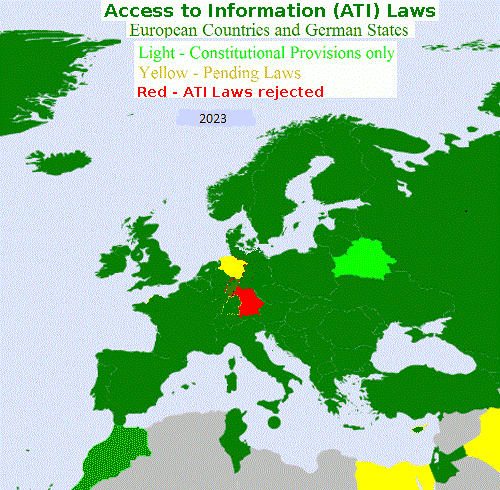
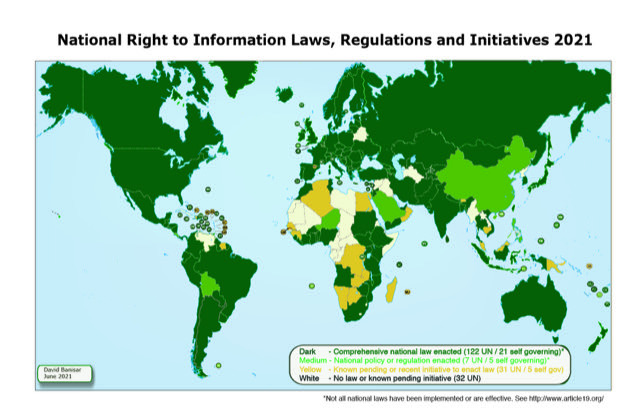
158 States ratified the UN Convention against Corruption:
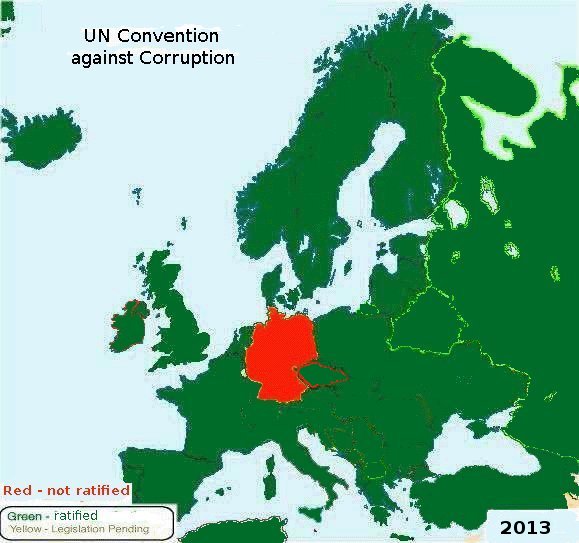
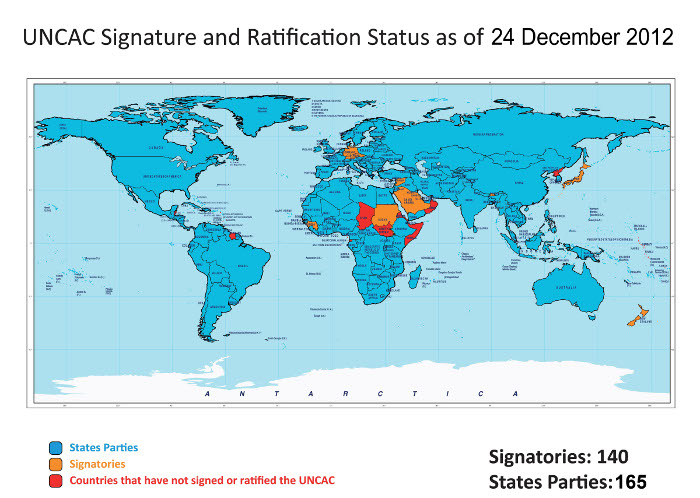
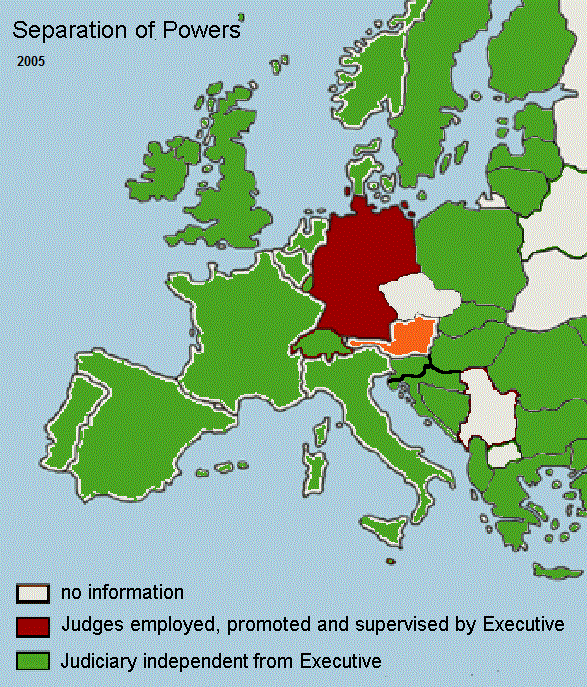
 auf Deutsch:
http://wkeim.bplaced.net/files/if-dimr-pbt.htm
auf Deutsch:
http://wkeim.bplaced.net/files/if-dimr-pbt.htm auf Deutsch:
http://wkeim.bplaced.net/files/if-dimr-pbt.htm
auf Deutsch:
http://wkeim.bplaced.net/files/if-dimr-pbt.htm